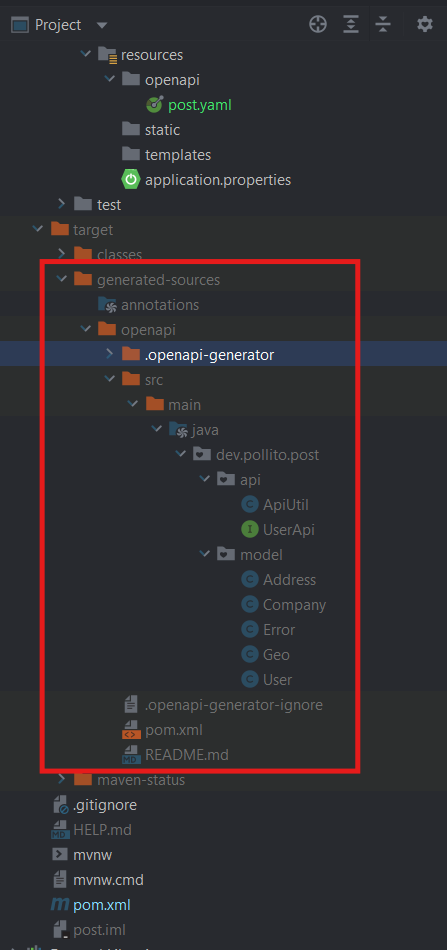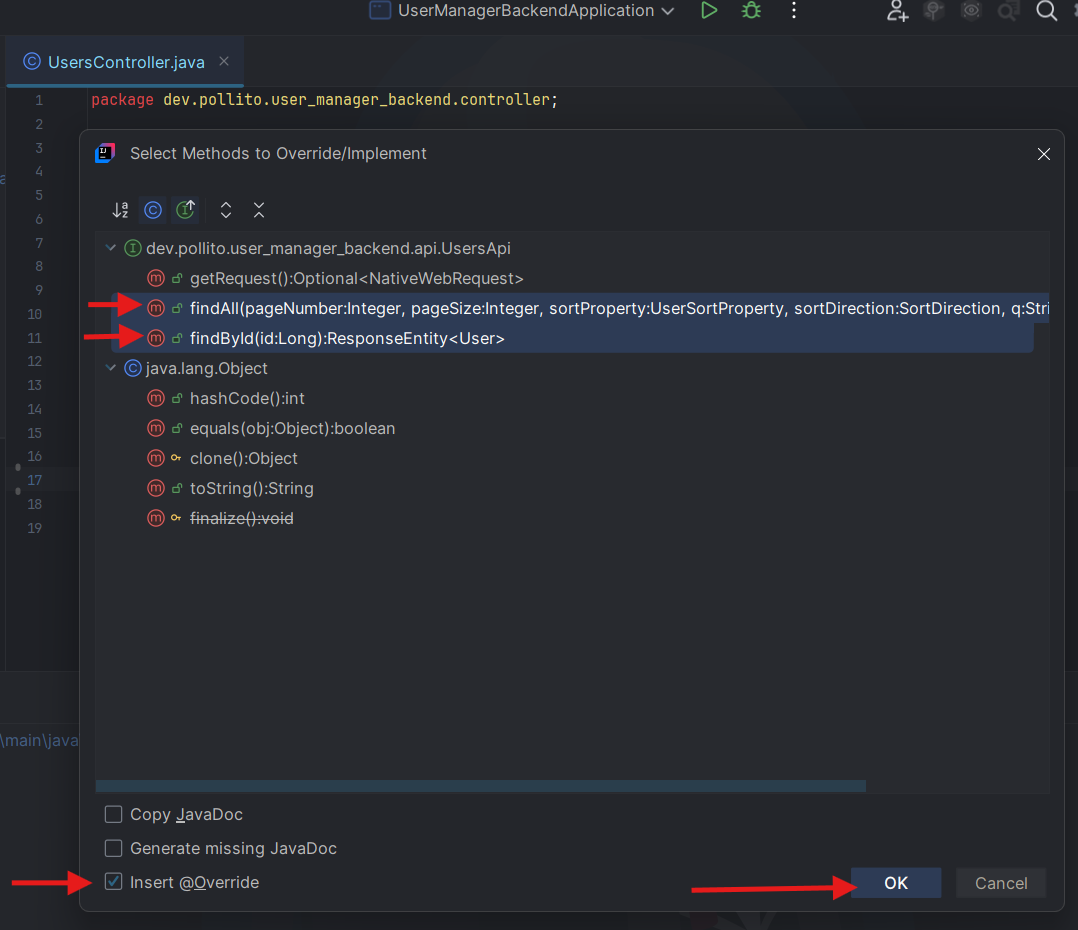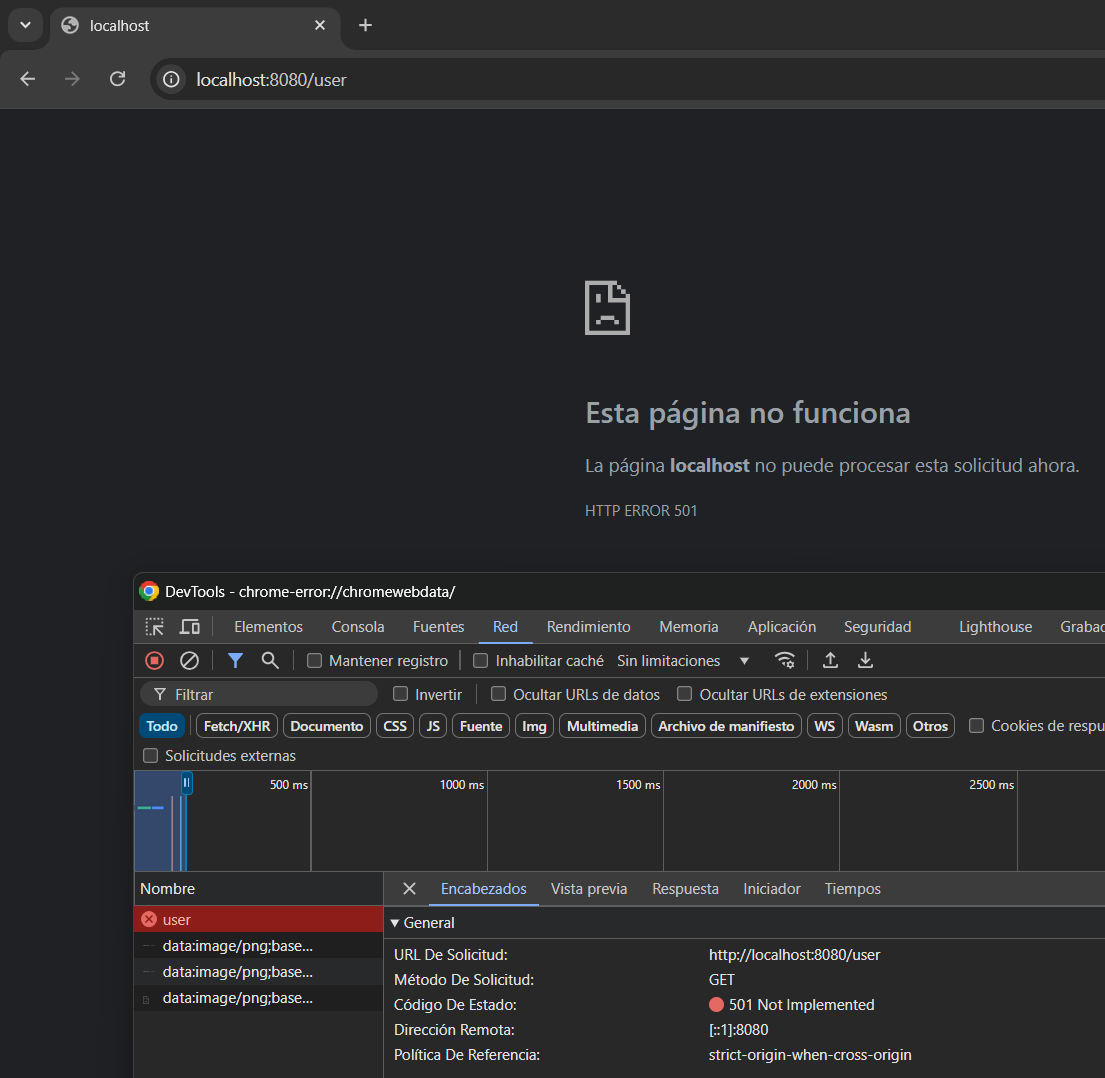Pollito's Opinion on Spring Boot Development 3: Spring server interfaces
Posted on October 2, 2024 • 6 minutes • 1103 words • Other languages: Español
- Some context
- 1. More dependencies
- 2. Write an OAS yaml file
- 3. Generate the interfaces
- 4. Implement the interfaces
- Next lecture
Some context
This is the third part of the Spring Boot Development blog series.
- The objective of the series is to be a demonstration of how to consume and create an API following Design by Contract principles .
- To achieve that, we are creating a Java Spring Boot Microservice that handles information about users.
- You can find the code of the final result at this GitHub repo - branch feature/feignClient .
- Here’s a diagram of its components. For a deep explanation visit Understanding the project

So far we created:
- LogFilter.
- GlobalControllerAdvice.
- An empty UsersController.
In this blog we are going to complete the UsersController. Let’s start!
1. More dependencies
These are:
Here I leave some ready copy-paste for you. Consider double-checking the latest version.
Under the <dependencies> tag:
<dependency>
<groupId>io.swagger.core.v3</groupId>
<artifactId>swagger-core-jakarta</artifactId>
<version>2.2.22</version>
</dependency>
<dependency>
<groupId>org.openapitools</groupId>
<artifactId>jackson-databind-nullable</artifactId>
<version>0.2.6</version>
</dependency>
<dependency>
<groupId>org.springframework.boot</groupId>
<artifactId>spring-boot-starter-validation</artifactId>
</dependency>
2. Write an OAS yaml file
Here’s the example I’m going to be using for this blog series.
resources/openapi/userManagerBackend.yaml
openapi: 3.0.3
info:
title: user_manager_backend API
description: A RESTful API for managing a database of users. Supports CRUD operations.
version: 1.0.0
contact:
name: Pollito
url: https://pollito.dev
servers:
- url: 'http://localhost:8080'
description: dev
- url: 'https://user-manager-backend-den3.onrender.com'
description: prod
paths:
/users:
get:
tags:
- User
summary: List all users
operationId: findAll
parameters:
- description: Use this parameter to specify the page of your request
in: query
name: pageNumber
schema:
default: 0
minimum: 0
type: integer
- description: Use this parameter to specify a pagination limit (number of results per page) for your request
in: query
name: pageSize
schema:
default: 10
maximum: 10
minimum: 1
type: integer
- description: Use this parameter to specify the property by which you want to sort the results of your request
in: query
name: sortProperty
schema:
$ref: '#/components/schemas/UserSortProperty'
- description: Use this parameter to specify the direction (asc or desc) of your request results
in: query
name: sortDirection
schema:
$ref: '#/components/schemas/SortDirection'
- description: Use this parameter to filter users by checking if provided string is part of email, name, or username (all ignore case). If not used, no filtering will be done.
in: query
name: q
schema:
minLength: 2
maxLength: 255
type: string
responses:
'200':
description: List of all users
content:
application/json:
schema:
$ref: '#/components/schemas/Users'
default:
description: Error
content:
application/json:
schema:
$ref: '#/components/schemas/Error'
/users/{id}:
get:
tags:
- User
summary: Get user by identifier
operationId: findById
parameters:
- description: User identifier
in: path
name: id
required: true
schema:
format: int64
type: integer
responses:
'200':
description: A user
content:
application/json:
schema:
$ref: '#/components/schemas/User'
default:
description: Error
content:
application/json:
schema:
$ref: '#/components/schemas/Error'
components:
schemas:
Address:
description: User address
properties:
city:
description: Address city
example: "Gwenborough"
type: string
geo:
$ref: '#/components/schemas/Geo'
street:
description: Address street
example: "Kulas Light"
type: string
suite:
description: Address suit
example: "Apt. 556"
type: string
zipcode:
description: Adress zipcode
example: "92998-3874"
type: string
type: object
Company:
description: User company
properties:
bs:
description: Company business
example: "harness real-time e-markets"
type: string
catchPhrase:
description: Company catch phrase
example: "Multi-layered client-server neural-net"
type: string
name:
description: Company name
example: "Romaguera-Crona"
type: string
type: object
Error:
properties:
detail:
description: Description of the problem.
example: No value present
type: string
instance:
description: The endpoint where the problem was encountered.
example: "/generate"
type: string
status:
description: http status code
example: 500
type: integer
title:
description: A short headline of the problem.
example: "NoSuchElementException"
type: string
timestamp:
description: ISO 8601 Date.
example: "2024-01-04T15:30:00Z"
type: string
trace:
description: opentelemetry TraceID, a unique identifier.
example: "0c6a41e22fe6478cc391908406ca9b8d"
type: string
type:
description: used to point the client to documentation where it is explained clearly what happened and why.
example: "about:blank"
type: string
type: object
Geo:
description: Address geolocation
properties:
lat:
description: Geolocation latitude
example: "-37.3159"
type: string
lng:
description: Geolocation longitude
example: "81.1496"
type: string
type: object
Pageable:
type: object
properties:
pageNumber:
description: Current page number (starts from 0)
example: 0
type: integer
pageSize:
description: Number of items retrieved on this page
example: 1
type: integer
SortDirection:
type: string
enum: [ ASC, DESC ]
default: ASC
User:
properties:
address:
$ref: '#/components/schemas/Address'
company:
$ref: '#/components/schemas/Company'
creationTime:
description: Creation time in ISO 8601 format
example: "2023-11-01T08:30:00"
type: string
email:
description: User email
example: "Sincere@april.biz"
type: string
id:
description: User id
example: 1
format: int64
type: integer
name:
description: User name
example: "Leanne Graham"
type: string
phone:
description: User phone
example: "1-770-736-8031 x56442"
type: string
username:
description: User username
example: "Bret"
type: string
website:
description: User website
example: "hildegard.org"
type: string
Users:
properties:
content:
type: array
items:
$ref: '#/components/schemas/User'
pageable:
$ref: '#/components/schemas/Pageable'
totalElements:
description: Total number of items that meet the criteria
example: 10
type: integer
type: object
UserSortProperty:
enum: [
email,
id,
name,
username
]
default: id
type: string
3. Generate the interfaces
Add the openapi-generator-maven-plugin plugin.
Here I leave some ready copy-paste for you. Consider double-checking the latest version.
Under the <plugins> tag:
<plugin>
<groupId>org.openapitools</groupId>
<artifactId>openapi-generator-maven-plugin</artifactId>
<version>7.8.0</version>
<executions>
<execution>
<id>spring (server) generation - <!-- todo: replace with the name of the OAS file -->.yaml</id>
<goals>
<goal>generate</goal>
</goals>
<configuration>
<inputSpec>${project.basedir}/src/main/resources/openapi/<!-- todo: replace with the name of the OAS file -->.yaml</inputSpec>
<generatorName>spring</generatorName>
<output>${project.build.directory}/generated-sources/openapi/</output>
<apiPackage>${project.groupId}.${project.artifactId}.api</apiPackage>
<modelPackage>${project.groupId}.${project.artifactId}.model</modelPackage>
<configOptions>
<interfaceOnly>true</interfaceOnly>
<skipOperationExample>true</skipOperationExample>
<useSpringBoot3>true</useSpringBoot3>
<useEnumCaseInsensitive>true</useEnumCaseInsensitive>
</configOptions>
</configuration>
</execution>
</executions>
</plugin>
Do a maven clean and compile.
If you check the target\generated-sources\openapi\ folder, you’ll find everything that was generated. Those files represent the OAS we fed the plugin with.

4. Implement the interfaces
Make the simple @RestController located in the controller package implement the desired interface that was generated in the previous step.
Then in IntelliJ, if you press Ctrl+O while standing in the line that has the implements statement, a pop-up window will appear asking you which methods you’d like to override:

Select the ones that you are interested in. IntelliJ will autofill the class. Now it looks something like this:
controller/UsersController.java
import dev.pollito.user_manager_backend.api.UsersApi;
import dev.pollito.user_manager_backend.model.SortDirection;
import dev.pollito.user_manager_backend.model.User;
import dev.pollito.user_manager_backend.model.UserSortProperty;
import dev.pollito.user_manager_backend.model.Users;
import lombok.RequiredArgsConstructor;
import org.springframework.http.ResponseEntity;
import org.springframework.web.bind.annotation.RestController;
@RestController
@RequiredArgsConstructor
public class UsersController implements UsersApi {
@Override
public ResponseEntity<Users> findAll(Integer pageNumber, Integer pageSize, UserSortProperty sortProperty, SortDirection sortDirection, String q) {
return UsersApi.super.findAll(pageNumber, pageSize, sortProperty, sortDirection, q);
}
@Override
public ResponseEntity<User> findById(Long id) {
return UsersApi.super.findById(id);
}
}
Now try http://localhost:8080/user . You should get the default response from the generated code, which is 501 NOT IMPLEMENTED:

Next lecture
If your microservice is not going to consume a REST endpoint, then this is all you need.
But don’t you have curiosity how to do that while following Contract-Driven Development best practices? I know you do. Follow this next lecture: Pollito’s Opinion on Spring Boot Development 4: feignClient interfaces

